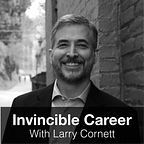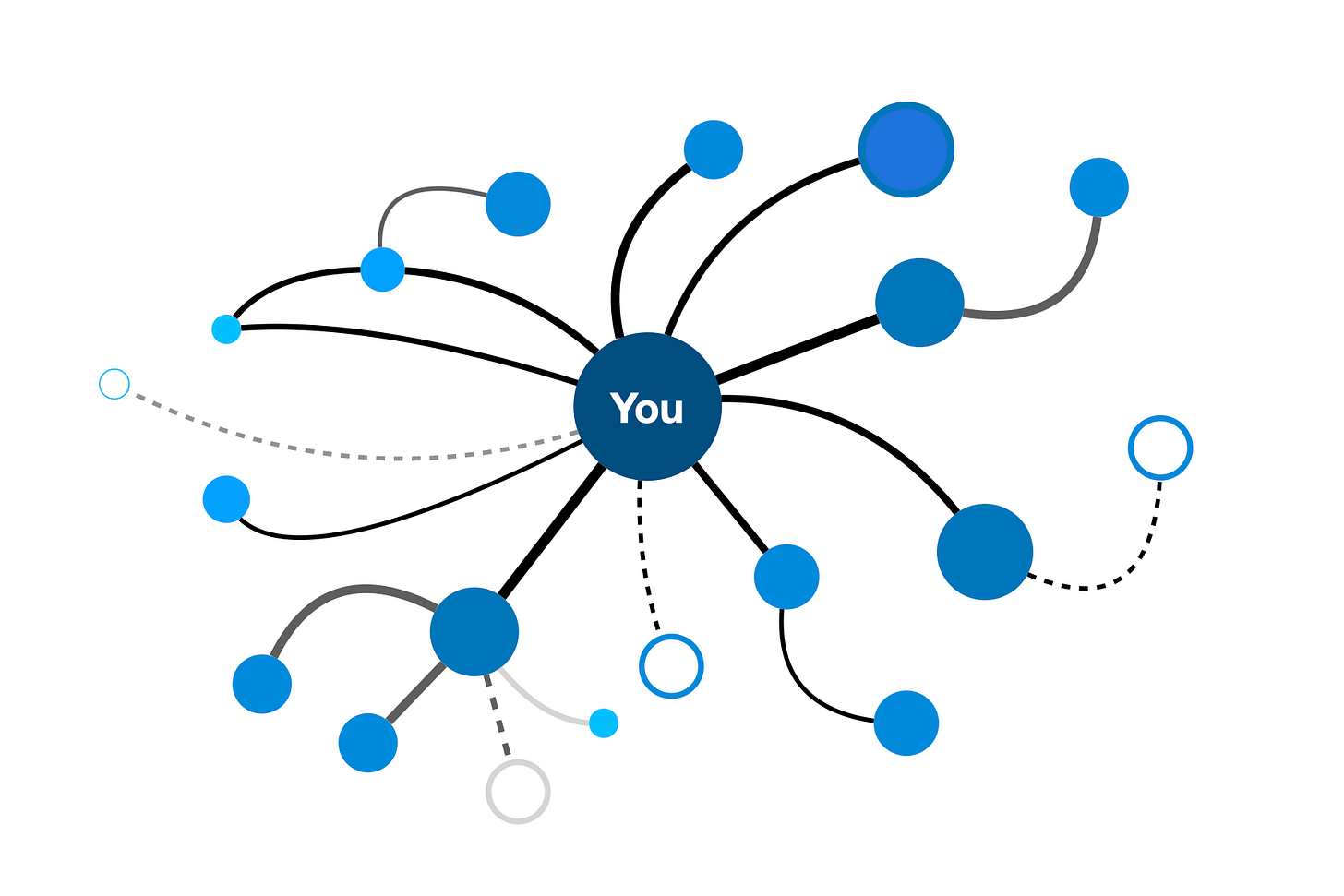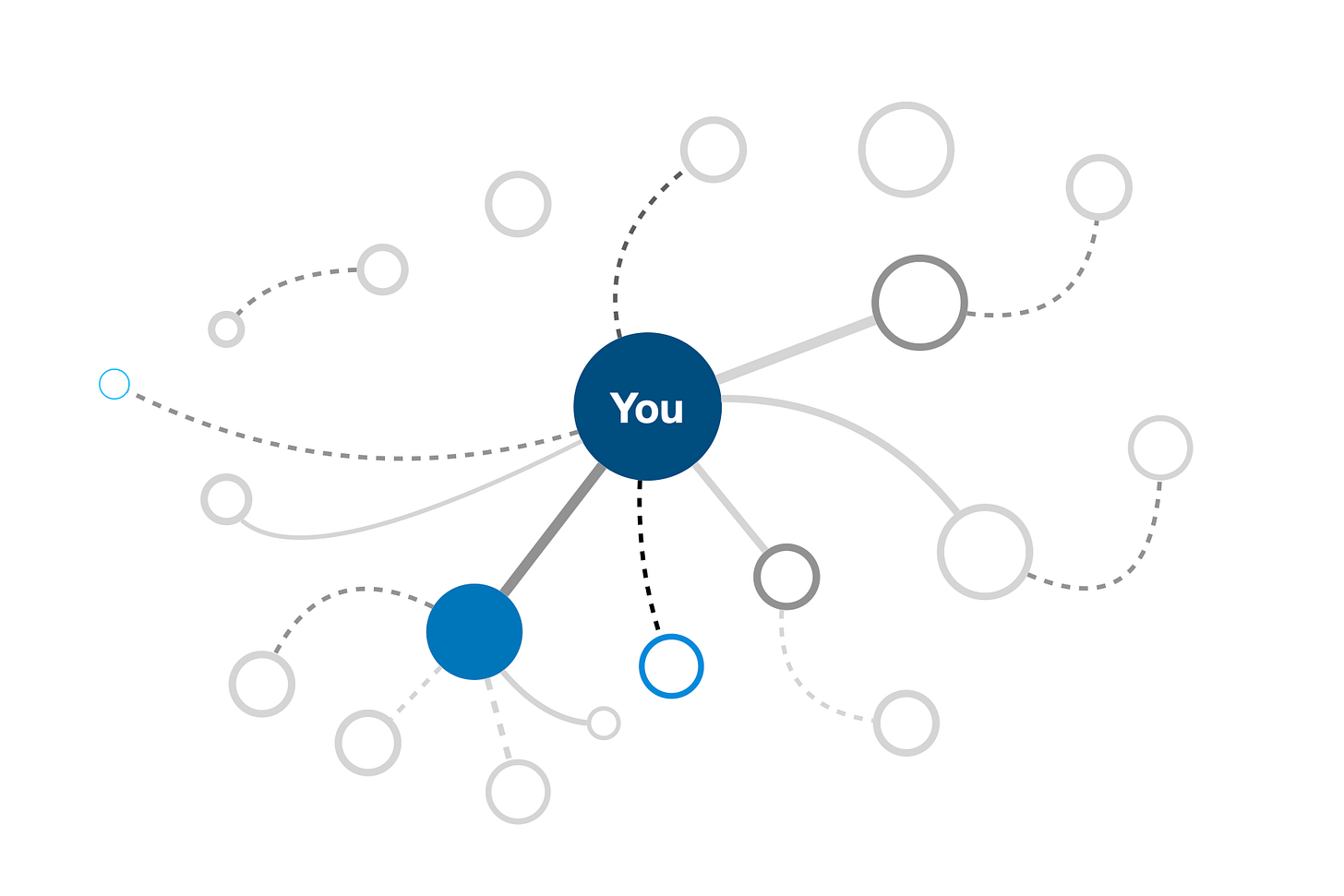Why do some people hear about opportunities before you do?
Are they that much smarter than you?
Are they liked more than you?
Are they better than you?
Before you get angry with me, let me say it’s probably none of the above. When this happens, it’s usually because:
More people know who they are.
More people see their work.
People think about them.
But why are more people thinking of them more often? Well, the answer lies in a lesson about how memory works. The big “neural network” of your personal connections behaves much like the smaller neural network in our brains.
Two things are at work:
Long-term potentiation
The Priming Effect
People who are receiving more consideration and opportunities are lighting up and frequently strengthening connections between nodes in their network. Let me be nerdy for a minute and remind you of the neuroscience you probably learned in high school.
Long-term potentiation
Long-term potentiation boosts neural pathways to facilitate the transmission of signals and the creation of long-term memories. This occurs when more activity between neurons boosts neurotransmitter production, increases receptor formation, and builds stronger synaptic connections. Yes, that is a simplified explanation, so don’t come at me if you’re a neuroscientist. 🤣
A low-frequency event triggers a weak response (e.g., posting something once in a while that someone rarely sees in their feed). This may create a short-term memory for someone, but it won’t result in a long-term memory. For example, they’ll briefly wonder what you’ve been up to but get on with the rest of their day and forget what you posted by tomorrow.
However, when high-frequency events trigger a stronger response, it changes how the memory is formed. This can happen when you consistently post content or reconnect with someone over Zoom, coffee, or lunch. In other words, someone will remember you, what you do, and what you’re seeking for a longer period of time. Several months later, they will think of you when a relevant opportunity presents itself.
So, at the individual level, interacting more frequently and deeply with the people in your network can lead to stronger memories of you. You are triggering changes in their brains.
What’s kind of cool and exciting—if you’re a nerd like me—is what then happens at a higher level across the broader network of people. You can think of each person as a neuron within a human web of connections that behaves like a neural network.
You are more strongly connected to some people than others. The intensity of that connection matters, of course. You have a deeper bond with your close friends and family than with your coworkers (I hope!). The frequency of interaction affects the connections, too. You will forge a stronger relationship with people you work with every day vs. an old college roommate you haven’t talked with in over 20 years.
Stimulating activity in one person (e.g., mentioning that you’re looking for a new job during a coffee chat with a friend) can pass that information through their network to more nodes (i.e., people). The more frequently people are thinking and talking about you, the more often your name will come up when exciting opportunities arise.
For example, Susan tells Bob that she’s struggling to find a great design manager for her team. Bob says, “Oh really? I know a talented manager who might be looking for a role like that. Let me send you their LinkedIn profile and tell me what you think. I can make an introduction later if you like.”
The more you interact with people, the more powerful your network becomes. Relationships grow stronger and more valuable. More people light up in that web of connections, and those people have their own networks that now link to yours.
Conversely, when you let your network connections go stale, people forget about you. I know this can happen when you’re busy with work and life. But it has an undesirable impact on your career and future potential.
You will not be in the consideration set when someone is looking for:
Someone to hire into their organization.
A person to recommend for a friend’s new role.
A speaker for an event or panel.
A partner to help them with a workshop.
A service provider for a potential client.
This might be upsetting, but you can’t really blame anyone. We are all busy with hectic lives at work and at home. If you haven’t been doing anything to stay fresh and relevant in someone’s mind, it’s no wonder they remember someone else who has been keeping more active.
If you want people to think about you, periodically strengthen connections with folks in your existing network. Make a list of folks to reach out to every week and month. Schedule a bit of time to make sure it happens.
Be authentic and make a genuine effort to reconnect. Don’t be that person who only reaches out when you need a favor. Don’t lead with, “Hey good buddy, how ya doing? I’m looking for a new job. Do you know anyone who is hiring?”
One great way to strengthen your relationships with people is to express gratitude (Happy Thanksgiving, by the way!). I know I’ve talked about this before, but how often do you do it? For example:
Let a past colleague know you were thinking about them and remember how much you enjoyed working together at company ABC.
Tell a coworker that you remember how much they helped you with Project XYZ and that you still appreciate that.
Reconnect with an old boss who looked out for you (e.g., “Hey, I don’t think I ever thanked you for being such a great boss. You really took care of us, and I learned a lot from you. Just wanted to say thanks!”).
Reach out to someone you met at a conference who made an impression on you with their talk.
Build new connections so thoughts of you transmit more readily throughout the broader network. Your close friends and colleagues probably have a lot of overlap with your network. So, if you want to expand and meet new people, you have to seek out folks you don’t see all the time.
However, there is another factor at work when people think of someone’s name when an opportunity comes up. It’s almost as if they’ve been primed to remember them…
Priming Effect
I want you to visualize chopped carrots, fresh peas, diced potatoes, and cubed chicken. Now, fill in the blank letter in this word:
S O _ P
What word did you complete? You most likely came up with SOUP instead of SOAP unless you use a very strange kind of soap for your showers.
Scientists have described priming effects as “a sort of rational bias, where the mind interprets ambiguous new perceptual information in a way that is consistent with information it has recently perceived.”
You can use this psychological bias to your advantage. When you frequently prime others with your name, who you are, and what you know and do well, it can stimulate faster recall of you later when appropriate opportunities arise.
Who is the best mobile app designer you know?
Who knows sales better than anyone else?
Who should I talk to about the future of AI?
Our marketing is not going so well. Who could help us?
I need help to find a new job. Do you know someone who can coach me?
For example, I’ve worked hard for the past seven years to write hundreds of articles and thousands of posts on social media to build awareness of my coaching. So, I’ve had people tell me they think of my name when someone says they need “career coaching.” And now people are thinking of me when they hear the term “lifestyle business.”
Great! That is intentional.
I didn’t accidentally create this priming effect between my name and coaching. I deliberately built it with a consistent habit of writing about careers, leadership, job searching, and solopreneurship. Every week, I add more content to the internet to strengthen the word associations I want.
The more specific your niche is, the better your chances are for dominating it. For example, I don’t even try to be known for general coaching, leadership, or entrepreneurship. There are way too many players already in those spaces and people with bigger names than mine. Instead, I’ve focused on making a name around helping tech professionals create invincible careers. I’m also building a name for helping mid-to-late career folks design sustainable lifestyle businesses when they’re frustrated with their jobs and ready to escape the 9-5.
So…
What do you want to be known for?
What do you actively do to strengthen that association with your name?
How do you reinforce that priming effect every day?
How many people think of you that way?
How many people talk about you when those words come up in a conversation?
You can—and should—intentionally invest time and energy in linking your identity to the roles you desire, skills you’ve mastered, and outcomes you want to be known for producing. It’s great if your inner circle of peers, coworkers, and managers knows all about you. But, one day, you’ll be in the job market, and you will want people to seek you out because you are known for what they need.
Leverage that priming effect so your name comes up in those conversations.
By the way, do you want to expand your professional network? Check out my career community!
I’m Larry Cornett, a success coach who can work with you to optimize your career, life, or business. My mission is to help you take complete control of your work and life so you can become a more “Invincible You.” I live in Northern California near Lake Tahoe with my wife and Great Dane.















